100 years of construction and development (1925-2025 ) , the Vietnamese revolutionary press has been nurtured and grown from pioneering, steadfast writers - veteran journalists who have made great contributions to the revolutionary cause of the nation. They are the ones who "use the pen as a weapon, use paper as a trench", as President Ho Chi Minh taught. Each person has a journey, a contribution, but all are shining examples of political courage, patriotism and social responsibility, contributing to building the glorious tradition of the Vietnamese revolutionary press.
Patriot and courageous journalist Huynh Thuc Khang
Journalist Huynh Thuc Khang (1876-1947), whose real name is Huynh Van Thuoc, was from Thach Binh village, Tien Canh commune, Tien Phuoc district, Quang Nam province. He was one of the typical patriots and one of the first revolutionary journalists of our country. He passed the Tam Giap Tien Si Hoi Nguyen exam under the Nguyen dynasty, but refused to become an official and devoted himself to the struggle against colonialism for national independence.
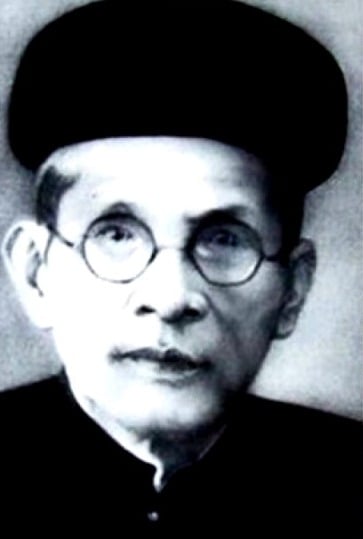 As a great intellectual, Huynh Thuc Khang chose journalism as a sharp weapon to promote patriotism and arouse national spirit. In 1927, he founded and directly served as the Chief Editor of Tieng Dan newspaper - the first national language political newspaper and had great influence in the Central region before the August Revolution. During its 16 years of existence (1927-1943), with 1,766 issues published, Tieng Dan made an important contribution to nurturing patriotism, self-reliance, and resistance to colonialism, and was a strong "voice" of the nation in the long night of slavery. Mr. Huynh Thuc Khang was a journalist with all his heart and integrity. Many times censored and threatened by the colonial government, he firmly maintained his stance: "Either publish the original text, or delete it, without changing a single word". For him, journalism was not just about transmitting information, but also a political act, demonstrating the spirit of a patriotic intellectual, not submitting to tyranny, not compromising with violence. After the August Revolution in 1945, President Ho Chi Minh invited him to join the provisional government, serving as Minister of the Interior and then as Acting President of the Democratic Republic of Vietnam when President Ho Chi Minh went to France. In that position, he always maintained his uprightness, integrity, honesty and dedication to the people. |
He passed away on April 21, 1947 while he was a special envoy of the Government working at the South Central Resistance Administrative Committee in Nghia Hanh, Quang Ngai province. In the letter announcing the state funeral of Mr. Huynh Thuc Khang, President Ho Chi Minh wrote: “Mr. Huynh was a man of great learning, strong will, and high morality… All his life, Mr. Huynh fought for the freedom of the people and the independence of the country.”
Because of these great qualities, in 1949, President Ho Chi Minh and the Party Central Committee decided to name the first journalism school during the resistance war as Huynh Thuc Khang Journalism School ( located in Bo Ra hamlet, Tan Thai commune, Dai Tu district, Thai Nguyen province) as a way to show gratitude and inherit the revolutionary journalism spirit of an exemplary scholar and journalist.
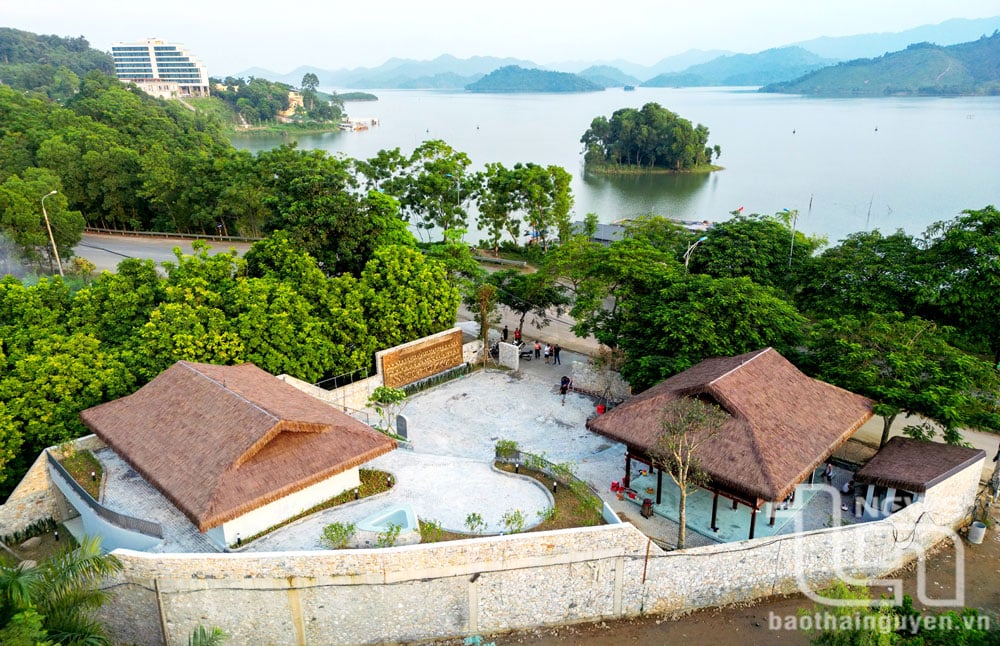
First President of Vietnam Journalists Association
In the flow of the history of Vietnam's revolutionary press, journalist Xuan Thuy is a typical name, who not only left a strong mark with sharp articles and profound strategic thinking, but was also a talented press organizer, who laid the foundation for the solid development of Vietnam's revolutionary press from the beginning of the seizure of power and throughout the two great resistance wars of the nation.
Journalist Xuan Thuy's real name is Nguyen Trong Nham, born in 1912 in a patriotic Confucian family in Hoe Thi village, Phuong Canh commune, Hoai Duc district, Ha Dong province (now Phuong Canh ward, Nam Tu Liem district, Hanoi). From his youth, journalist Xuan Thuy was aware of the revolution early, participated in the patriotic movement and was arrested by the enemy at Hoa Lo prison. In 1939, he was arrested by the enemy for the second time and exiled to Son La prison. In the harsh prison, journalist Xuan Thuy still maintained the spirit of a communist, both studying Marxist-Leninist theory and participating in writing revolutionary propaganda articles. Here, he and other revolutionary soldiers founded Suoi reo - the first prison newspaper, demonstrating the enduring vitality and steadfast spirit of revolutionary journalism in all circumstances.
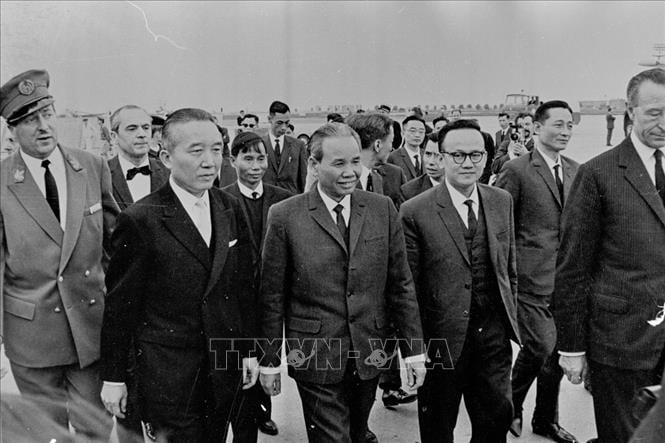
Since 1944, journalist Xuan Thuy was assigned as the Chief Editor of the Viet Minh's Cuu Quoc newspaper. He was both the leader of the newspaper and the main writer with many pen names such as Chu Lang, Tat Thang, Ngo Tat Thang... Under the leadership of Chief Editor Xuan Thuy, Cuu Quoc newspaper became the largest and most influential newspaper in the country at that time, the leading flag on the ideological front, the flag that gathered the masses, making great contributions to the success of the August Revolution, to the cause of resistance and nation building. Journalist Xuan Thuy was also the one who presided over the merger of Cuu Quoc and Giai Phong newspapers, naming the newspaper "Dai Doan Ket".
After the August Revolution, journalist Xuan Thuy was the organizer and leader of the establishment of many major press and media agencies in the country in the early days of independence, such as Voice of Vietnam (September 7, 1945), Vietnam News Agency (September 15, 1945), laying the foundation for a revolutionary press system that operated synchronously, effectively and widely.
In 1949, journalist Xuan Thuy organized the Huynh Thuc Khang Journalism School in the Viet Bac resistance base - the first journalism training class of the Vietnamese revolution, contributing to training a team of journalists with both political courage and professional qualifications, becoming journalists - soldiers on the ideological and cultural front. In 1950, he was also assigned by the Party Central Committee to direct the establishment of the Vietnam Journalists Association, now the Vietnam Journalists Association, and directly served as the association's President from its founding to 1962.
Not only a journalist, Xuan Thuy was also an outstanding leader and diplomat. As Head of the Negotiation Delegation of the Government of the Democratic Republic of Vietnam at the Paris Conference (1968-1973), he skillfully applied his political courage, strategic thinking and journalistic experience to fight diplomatically, mobilize international public opinion, and create support for the cause of national liberation and unification. Later, he continued to assume many important responsibilities of the Party and State, including the position of Deputy Prime Minister.
Top theoretical writer
Journalist Hoang Tung, former Secretary of the Party Central Committee and Head of the Central Propaganda Department, is one of the leading theoretical writers of Vietnam's revolutionary press. During more than 60 years of writing, he has left a strong mark in the history of the country's press with his sharp thinking, steadfast political will and dedication to his profession.
Born in 1920 in Ha Nam, originally a teacher in Nam Dinh, journalist Hoang Tung joined the revolution early and was arrested by the French colonialists, exiled to many prisons such as Hoa Lo (Hanoi), Son La (1940-1944). It was in that prison that he began to learn journalism under the guidance of journalist Tran Huy Lieu and had his first articles published in Suoi reo newspaper (1943-1944).
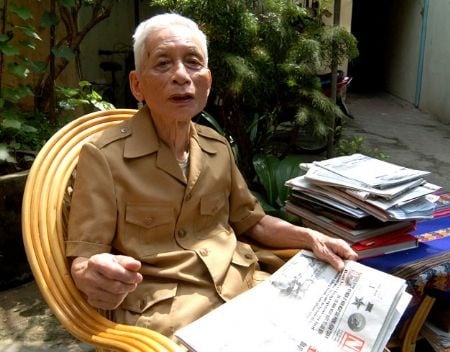
After the August Revolution, journalist Hoang Tung held many positions in the Hanoi Party Committee, wrote for Kien Thiet newspaper, and then worked for Dan Chu newspaper in Hai Phong. From 1948, he went to the Viet Bac resistance base, worked as editor-in-chief of theoretical magazines, and then became the Editor-in-Chief of Su That newspaper in 1950 - the predecessor of Nhan Dan newspaper. From 1954 to 1982, he held the position of Editor-in-Chief of Nhan Dan newspaper, contributing to shaping the style of the Party newspaper, sharp, full of fighting and theoretical spirit.
Journalist Hoang Tung is the author of thousands of editorials and political commentaries of great significance to the era. During the resistance war against the US to save the country, his articles were truly "battle trumpets" rich in imagery, sharp language, tight arguments, and touching people's hearts. From action movements such as "Dai Phong", "Duyen Hai", "3 San Tien", "3 Dac Dang"... to hot international issues, he always had quick-witted articles with clear directions, attracting the attention of domestic and international public opinion. Many of his articles were likened to "new manifestos", such as the editorial "The Nixon Doctrine is Certain to Fail", criticizing big countries negotiating on the backs of small countries, affirming the righteous strength of the Vietnamese people, the strength of the era of fighting for national independence. No matter how cunning the Nixon Doctrine was, it was certain to fail, the Vietnamese people were certain to win.
Not only a theoretical writer, journalist Hoang Tung is also an excellent press organizer. For nearly 30 years as Editor-in-Chief of Nhan Dan newspaper, he has contributed to building and developing a team of revolutionary journalists, discovering and nurturing young writers, directing the newspaper to delve into real life, vividly reflecting the breath of the revolutionary cause.
Not only writing for newspapers, he was also the editor of important Party documents such as the Political Report at the Third Congress (1960), the Sixth Congress (1986), and the biographer of many high-ranking leaders such as General Secretaries: Tran Phu, Ha Huy Tap, Nguyen Van Cu, Le Duan, Truong Chinh, Nguyen Van Linh, Pham Van Dong...
Journalist Hoang Tung passed away in 2010 at the age of 90. His life is a symbol of devotion, courage, and intelligence, a shining example of a true revolutionary journalist.
Journalist with "bright eyes, pure heart, sharp pen"
Journalist Nguyen Huu Tho (1932-2015) is one of the most prominent and dedicated writers of Vietnam's revolutionary press with nearly 60 years of writing experience. He held many important positions such as member of the Party Central Committee, Editor-in-Chief of Nhan Dan newspaper and Head of the Central Ideology and Culture Department. Through that, he contributed significantly to the orientation of ideology and the development of the country's revolutionary press.
Coming from a “backpacking, barefoot” reporter, journalist Huu Tho always delves into people’s lives, listening, observing and truthfully reflecting the aspects of society, especially negative issues such as corruption, bureaucracy, waste - painful “diseases” affecting the development of the country. He is famous for his sharp, straightforward writing style, contributing to creating a strong voice in press forums fighting for the purity of society.
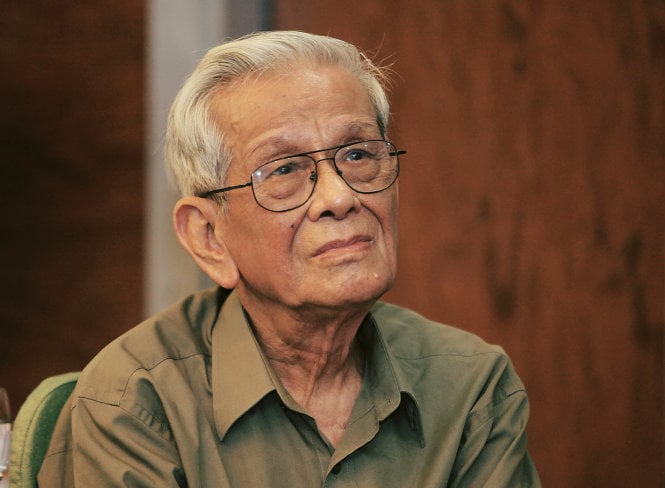
Not only is he a skilled writer, journalist Huu Tho is also a dedicated and passionate teacher of many generations of young journalists. He has compiled many valuable works, of which the book series Bright Eyes, Clear Heart, Sharp Pen has become the standard of ethics and journalistic skills for all generations of journalists. Through these works, he emphasizes three core elements that a journalist must have: Correct perspective (bright eyes), courage and ethics (clear heart), and sharpness in the pen (sharp pen). This is also the "original instinct" of a veteran writer, demonstrating the spirit of daring to look straight at social truth.
The Truth National Political Publishing House has published and reprinted 11 of his important works many times, contributing to providing valuable resources for journalism students, young journalists and interested readers. Books such as "Green Light, Red Light" share experiences in press management and work; "Dialogue" synthesizes interviews and debates on many hot social issues; "Love of Pen and Ink" is a deep gratitude to colleagues and friends who have accompanied him on the path of journalism; and "Family Stories, National Stories" is a collection of essays rich in humanity, reflecting social changes during the renovation period.

He is also one of the pioneering writers supporting innovation policies, taking the lead in speaking out against the negative aspects of the market economy, thereby contributing to raising awareness of the fight against corruption, waste and bureaucracy. Under his experienced pen, negative phenomena are thoroughly dissected with a close, profound but equally sharp and subtle satirical writing style, creating sympathy and awakening readers.
Journalist Huu Tho passed away in 2015, leaving behind a huge and valuable legacy for the Vietnamese revolutionary press. He was not only a staunch fighter, but also an exemplary model of professional ethics, conscience and social responsibility of journalists. His works and thoughts continue to be a source of inspiration, encouraging today's generation of journalists to maintain their bravery and honesty, contributing to building a clean and strong revolutionary press, accompanying the development of the country.
These are just four of many outstanding revolutionary journalists. They were not only witnesses of the times, but also writers of history with their own pens and ideals. From their dedicated and passionate writings, the flame of journalism has been preserved and spread through each generation. Today, the team of journalists continues to follow that path - loyal to the ideal, attached to the people, constantly innovating to be worthy of the glorious 100-year tradition of Vietnamese revolutionary journalism.
Source: https://baoquangninh.vn/nhung-nha-bao-cach-mang-tieu-bieu-3361330.html














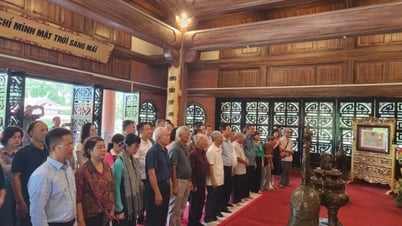
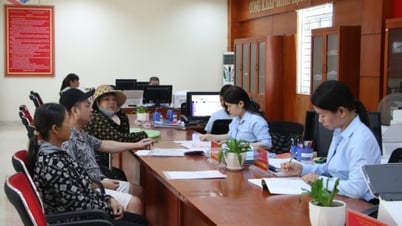





















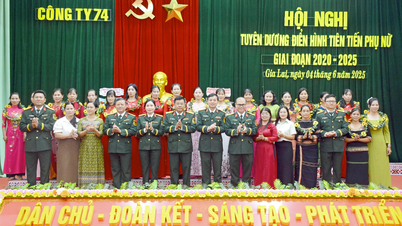






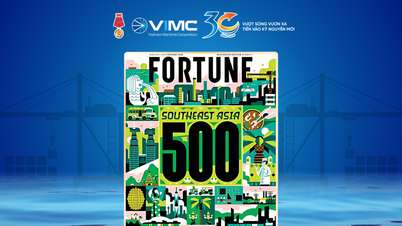


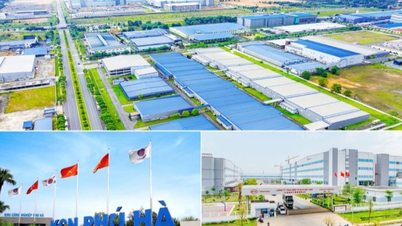






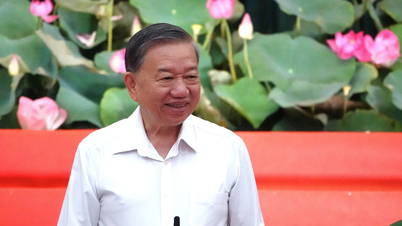
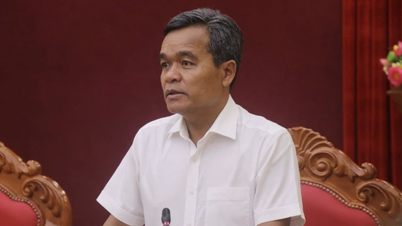
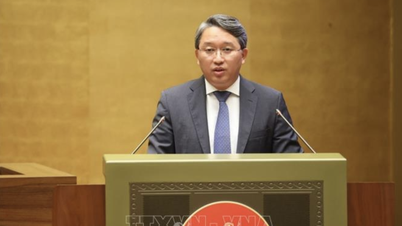



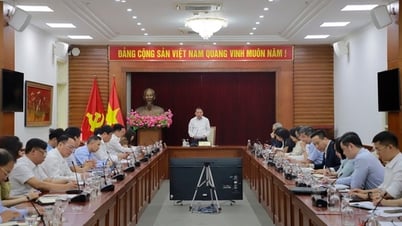
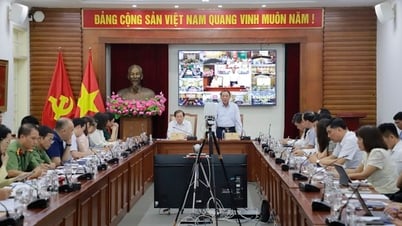





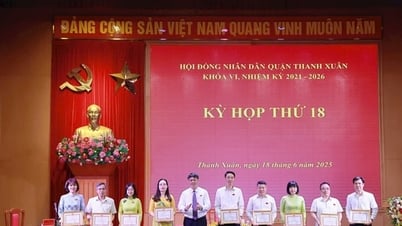



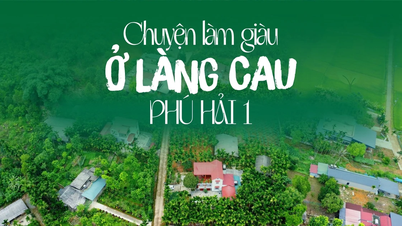

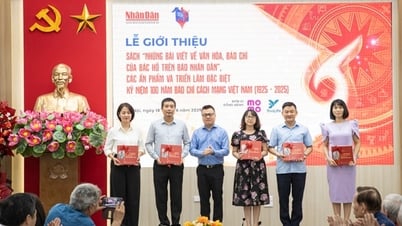













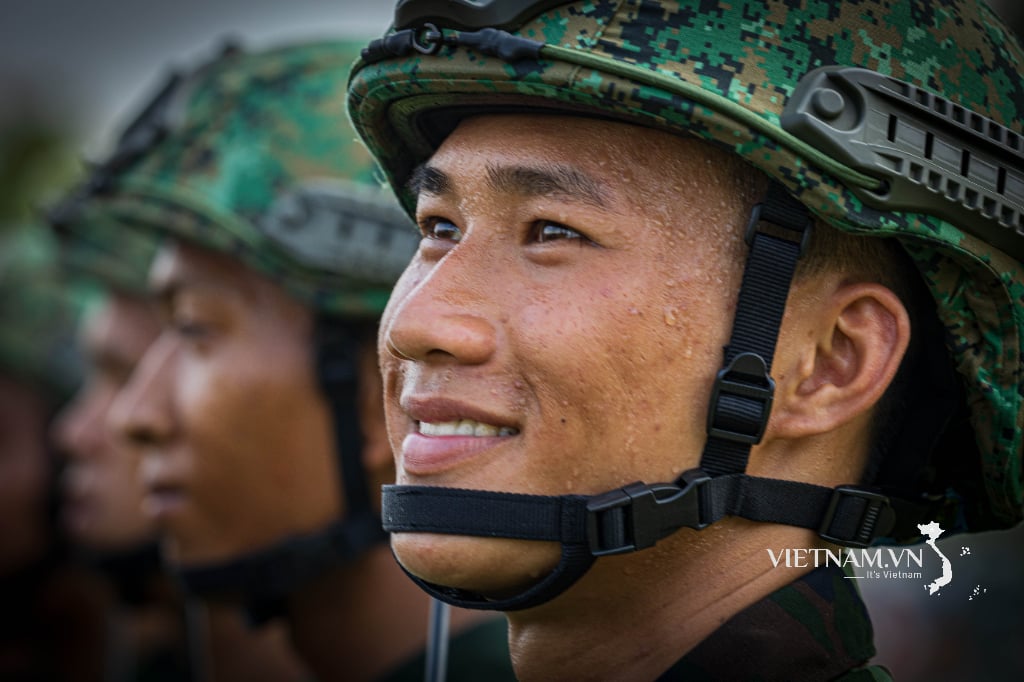


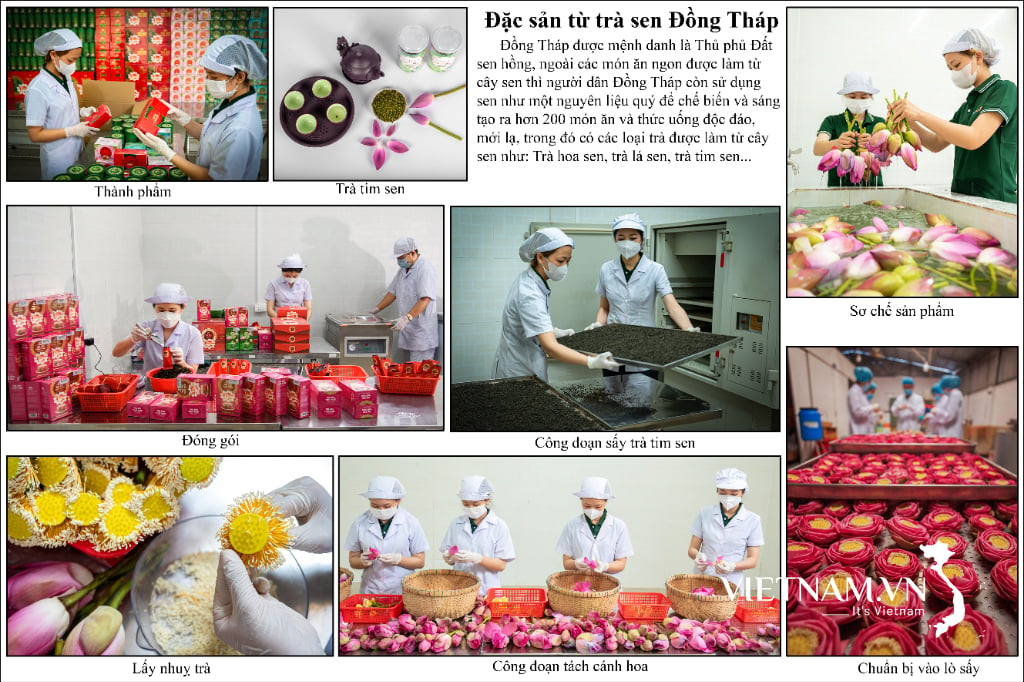
Comment (0)